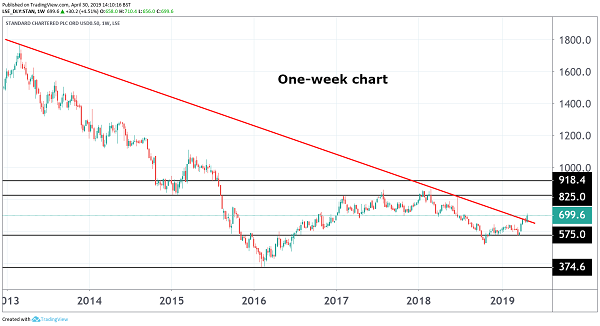Why Standard Chartered is best FTSE 100 stock
Hit ambitious return on equity targets and shares will look cheap. Success is already being priced in.
30th April 2019 13:51
by Graeme Evans from interactive investor
Hit ambitious return on equity targets and shares will look cheap. Success is already being priced in.

A promised first share buy-back in two decades today gave long-suffering Standard Chartered (LSE:STAN)shareholders a hint of what might be in store under the bank's three-year strategic plan.
The emerging markets lender said recently it wants returns on tangible equity of at least 10% by 2021, based on CEO Bill Winters' vow to "relentlessly" focus on areas where the bank has competitive advantage and to step up innovation and productivity.
While it is early days for his plan, Standard's commitment to re-distributing surplus capital was highlighted today by its pledge to carry out a buy-back of up to $1 billion this year. The move has been made possible by the long-awaited resolution of legacy conduct and control issues that have blighted the FTSE 100 bank in recent years.
A buy-back when it happens later this year would provide impetus to a share price that has not fully recovered from the slump seen in 2015, when Standard racked up a $1.5 billion loss - its first since 1989 -due to loan impairments amid the collapse in commodity prices.
The blue-chip stock rose 5% this morning to round off a strong April for Standard after a tepid first quarter. Following today's Q1 results, JP Morgan Cazenove and Shore Capital both reiterated their 'buy' recommendations at 820p and 975p respectively.

Source: TradingView Past performance is not a guide to future performance
Standard joins the ranks of UK-listed banks with buy-backs either underway or about to start. Lloyds Banking Group (LSE:LLOY) and HSBC (LSE:HSBA) have already embarked on their programmes, while the current round of quarterly results has shown that Barclays (LSE:BARC), The Royal Bank of Scotland (LSE:RBS) and Standard Chartered have enough spare capital to begin the process.
Standard's proposed share buy-back amounts to 4% of its market cap and will re-lever the balance sheet to the mid-point of its target core capital ratio of between 13% and 14%.
UBS analyst Jason Napier said a dip in this ratio to 13.9% in the first quarter meant his forecast for a $1.5 billion buy-back now looked too optimistic, with future pay-outs more likely to be driven by profit generation rather than re-leveraging.
Napier has a 'neutral' recommendation and price target of 610p amid a preference for the shares of Lloyds, Royal Bank of Scotland and Barclays.
However, he admits that the shares will look cheap if the return on equity target of 10% is achieved in 2021. While the figure in today's first quarter results was 9.6%, the overall 2019 return still has to take into account the UK bank levy due in the final quarter.
Underlying profits were 10% higher at $1.4 billion in the first three months of 2019, with the company reporting some signs of improving sentiment in its markets. The period also included the launch of a number of digital initiatives across Hong Kong, Africa and India aimed at growing its customer base and enhancing customer service.
Winters, who has been at the helm since 2015, added:
"Our first quarter profit supports our belief that we will generate full-year returns of at least 10% by 2021."
These articles are provided for information purposes only. Occasionally, an opinion about whether to buy or sell a specific investment may be provided by third parties. The content is not intended to be a personal recommendation to buy or sell any financial instrument or product, or to adopt any investment strategy as it is not provided based on an assessment of your investing knowledge and experience, your financial situation or your investment objectives. The value of your investments, and the income derived from them, may go down as well as up. You may not get back all the money that you invest. The investments referred to in this article may not be suitable for all investors, and if in doubt, an investor should seek advice from a qualified investment adviser.
Full performance can be found on the company or index summary page on the interactive investor website. Simply click on the company's or index name highlighted in the article.